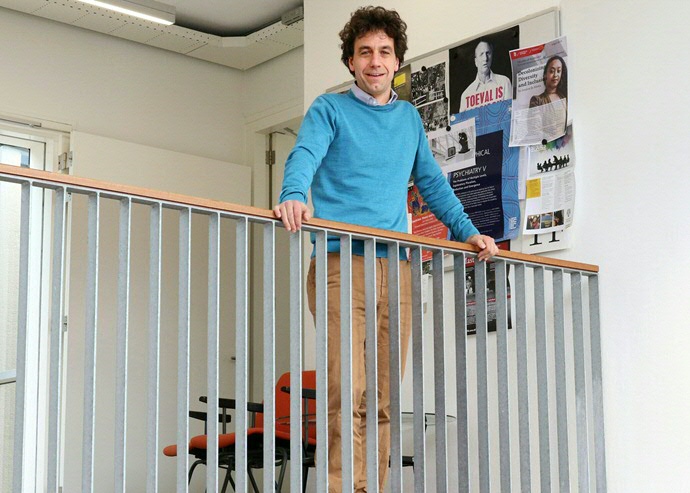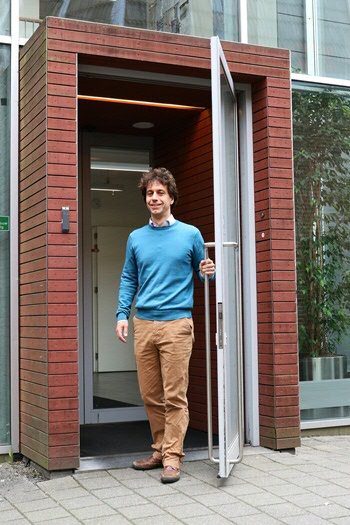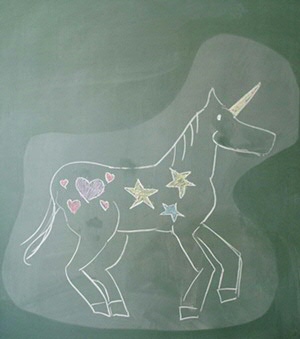The linking role of the philosopher

April is Philosophy Month. A good excuse for a chat with Professor of Philosophy of Science and physicist Jan-Willem Romeijn about the path of an academic, and the unifying power of curiosity and knowledge.
Text: Eelco Salverda, Communication UG / Photos: Hesterliena Wolthuis
‘I don’t know about you but I’m dying for a cup of coffee,’ says Romeijn, as he enters the room and takes off his coat. He proffers a plastic tub of kletskoppen biscuits. ‘Want one?’ Cheerful and chatty, he’s the kind of person who soon puts you at ease. With his tousled black hair and boyish appearance he wouldn’t look out of place onstage at a pop concert.
Philosophy by chance
Romeijn’s career could have ended up very different. He wasn’t destined to be a philosopher. He started out studying Mathematics and Physics, but swapped Mathematics for Philosophy after a year. ‘I wanted to know what all the theories were about,’ is his explanation. ‘Understand more about physics. For a long time I thought I would become a physicist.’ After graduating (cum laude in both degrees) he took a two-year detour into financial consultancy. To him this seems completely logical. ‘I had learned all about theories in physics that also allow you to say something about options. That’s how I ended up in the world of financial mathematics and econometrics. I got a job at a financial consultancy and there I learned more about statistics.’ But he ended up becoming a philosopher after all. ‘Yes, I think that’s where my heart lay. I often talked about philosophy at parties. What inspires me are the questions about what we know about the world. The role of knowledge culture in academia. I think I’m too much of a generalist to fit into physics.’ He approached Professor Kuipers, then a professor at the UG, asking if he could do research at the place where predicting, statistics and philosophy meet. ‘That’s how I ended up back in academia with a PhD place,’ says Romeijn.

Open doors
Romeijn is now Professor of Philosophy of Science and examines questions such as ‘What can we know?’, ‘What do we know about the world?’ and ‘What is correct?’ In his inaugural lecture he argued that philosophy research should play a pivotal role in academia. He’s not all words and no action either: he really does want philosophy to serve academia and does what he can achieve this. ‘I do a lot of work with researchers. Philosophers can provide methodological clarification, can say if a method works. For instance, I have looked a lot at measuring methods in psychology, and wrote an article together with a psychologist on what does or doesn’t make a certain method good. But I also work with archaeologists, sociologists and mathematicians. And I consult with Kenneth Kendler, from the review committee of the DSM, the big manual of disorders, to see if the classification principles work. I give workshops too. For judges, for instance, on how to decide what is the truth. I find these kinds of things important. Philosophers of science must open their doors! Get out there!’
Counterculture
Romeijn believes that our knowledge culture has shaped our academic practice. Does this imply that academic practice differs in countries with a different cultural-philosophical tradition? ‘I’m involved in setting up a department of philosophy of science in Fudan, China. Their academic practice is based on the Western model. And empirical laws are the same everywhere. If I drop a tennis ball off the Martinitoren it will fall just as fast as it would there. But the academic practice will also take other forms, based on their culture. Their social structure is different, and that has an effect. We always organize a counterculture. We seek debate and encourage the development of opposing opinions. That sharpens your opinion. It’s different there.’
Academia as connecting force
‘What really makes me happy, also with such a project in another culture, is that there is something that connects us all,’ Romeijn continues enthusiastically. ‘The curiosity, the questions and the hunt. That’s a huge motivation for me. That connection goes beyond cultural borders. It’s what makes us human. It’s what makes us all the same. And it’s an ongoing development. Call it the Enlightenment ideal. In the past there were German and French subcultures within mathematics. That’s inconceivable now. We’ve bridged the gap. Science is a social force that connects. Philosophers came to that conclusion early on. I can identify with that tradition.’

Imagination
April is Philosophy Month, and the theme is Power to the Imagination. What does this mean to Romeijn? ‘Philosophy can teach you to look differently at a problem, to think differently about value. In that sense it wouldn’t be that odd to involve philosophers more literally in power.’ Learning to look differently; inspiration is sometimes close to home. Someone has drawn a beautiful unicorn adorned with coloured hearts on a blackboard on the wall. The expression of the imagination of one of his young children. How much do they know about his work? ‘I tell them that I teach and that I puzzle over how things are. That’s something they understand. That’s what they do all the time. Things that are obvious to us still surprise them. If you lack knowledge you become curious about everything.’
No sitting in corners
Philosophy Month, philosophy nights, a philosopher laureate... Philosophy is hip. What has this popularity achieved for society or academia? ‘If you look for meaning in philosophy you’ll end up feeling short-changed,’ says Romeijn. ‘Philosophy doesn’t provide answers. It asks questions. But if you have a healthy intellectual interest and want to hone your mind, such a month has a lot to offer. And if you’re really serious about philosophy you’ll have to study it, which is more than possible here,’ he laughs. ‘But I think it’s good that there is such a month. As a philosopher you shouldn’t shut yourself off, shouldn’t go and sit in a corner.’ That openness again. His easy relaxed demeanour goes well with his vision of connection. You’re more likely to establish a connection if the exchange is personal. A cup of coffee and a kletskop is all it takes.
More news
-
08 December 2025
Citizen participation essential for a sustainable energy future
-
02 December 2025
Trust in science requires integrity in communication
-
28 October 2025
The search for responsibility in the financial world
